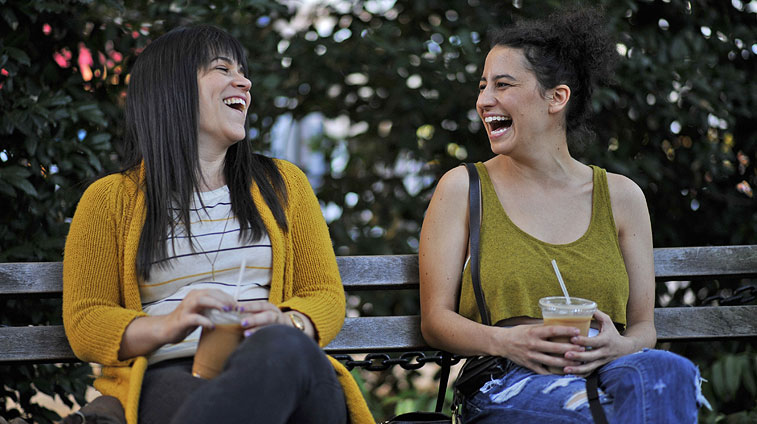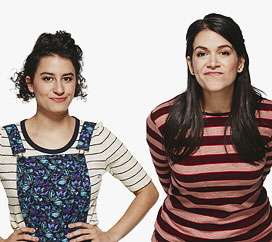
Broadly Speaking
Broad City’s Abbi Jacobson & Ilana Glazer might be paving the way for women in comedy, but the creators of the Comedy Central critical darling say what they really care about is what’s funny.
 Patrik Giardino
Lana Glazer and Abbi Jacobson
Patrik Giardino
Lana Glazer and Abbi Jacobson
We’ve always just written and performed what we thought was funny. But it was the world, and the world’s sexist content, that makes us increasingly aware of our gender.
—Ilana GlazerComedy Central’s Broad City, now in its 3rd season and re-upped for two more, centers on a pair of Jewish, hip-hop-loving stoner dorks that somehow combine the millennial Manhattanite hipsterism of Girls with the scatological buffoonery of Family Guy, in a show that ultimately defies any apt comparison. Creators Abbi Jacobson and Ilana Glazer play super bffs Abbi and Ilana, two marginally employed New York City twentysomethings whose friendship leaves nothing to the imagination. From the time Abbi’s hot neighbor is visiting and her poop won’t flush, to Ilana’s penchant for carrying weed around the city in her body, or what she refers to as “nature’s pocket,” these two go there.
It might seem to some that the point here is to dismantle old boundaries on what women comics are “supposed” to be able to do – inequities that have been well besieged by a growing legion of women in comedy from Sarah Silverman, Amy Schumer, and Lena Dunham to veterans like Amy Poehler (who’s an EP on the show), but that’s not the case. Any suggestion that it is illicits a weary pause from Glazer and Jacobson. They really don’t give a shit, they say, about anything but what they think is funny.
This total absence of pretense is the central freedom of their show, which also features stand-up Hannibal Buress in the recurring role of Lincoln Rice, a pediatric dentist and Abbi’s friend with benefits. The two originally honed their act at the Upright Citizens Brigade until 2009, when they started a Web series that got them inked to Comedy Central without ever having written an episode of television.
They spoke with the Writers Guild of America West website about the perils and rewards of that first season, which aired in 2014, when they discovered how arc, plot and character development grew the comedic and narrative power of their original Web vignettes by many orders of magnitude.
Take me back to the inception of the show as a Web series. What were you setting out to do?
Abbi Jacobson: In the beginning, we both came up taking classes at the Upright Citizens Brigade Theatre, and we were sort of struggling to get on that stage and to find an outlet for our voices. We were friends, and we were on an improv team together for two years before that, and we just came to this realization – individually and together as friends – like, why don’t we just make something? We know we’re funny, we have this interesting dynamic… Web series were not as big as they are now, and we were just setting out to have a link of some kind to send our parents to prove that we were doing comedy, and to prove to ourselves that we could. And yeah, that’s where we started, just to find a tangible way to prove that we could do it.
Because you're funny and you could, basically?
Abbi Jacobson: Yeah.
The show that’s now on Comedy Central is super scatological and prurient. It’s also got this unflinchingly honest, even unflattering, approach to you as the star characters, sort of reminiscent of Louie or Curb your Enthusiasm. How quickly did you find the comedic tone of this show? Did it take a bunch of work, or was it just a natural thing from the get go?
Ilana Glazer: Thank you for the comparisons, they're very flattering. The tone of the show was there since zygote form, when we were just on an improv team and realizing that we had a kind of unique dynamic compared with other friends. The Web series was all about tone – we didn’t have plot, we didn’t have arc, we didn’t have character growth. It was all about tone, and that was what we had a handle on since the beginning.
But the tone has grown with the expansion into a half-hour sitcom. That interplay between comedy rhythm and the type of jokes with plot is what makes up the tone of the TV show. There’s tone on a Web series, but there's less at stake there. So in the first season, we really discovered how our tone was going to play in a half-hour. But it also keeps growing. Like this year, the tone grows into deeper, darker places then it ever has before. By the time the show is over, there will be an overall tone of the series that will average out from season 1 to season x, whatever it is. We definitely had samples [of our own tone] and knew [the characters’] dynamic. But we also like to switch up the dynamic and keep pushing those boundaries, ‘cuz the tone is kinda whatever we decide it is. This year we get even sillier and even more serious, so we’re still discovering the tone ourselves.
When you started the proper show, from a writing standpoint, suddenly you’re talking about plots and arcs and so forth. Were you daunted at all about the writing demands and how the format would affect the material?
Abbi Jacobson: Yeah, definitely. When we first started writing the TV version, it was a very different thing for us. The Web series was whatever we wanted. We wrote it in script format, obviously, but even just getting down to how to write an outline for Comedy Central, and then bringing it to script format… that’s a very different thing than writing a three-minute sketch; how to translate what was a sketch Web series, into basically a sitcom, because I don’t consider our show a sketch show. That first season was a huge learning process for us through each stage of the production. The writing was probably the biggest – I mean we were just thrown into it, so it was like, “Ahh!”
Baptism by fire, or whatever?
Abbi Jacobson: Yeah.
Were there pleasant surprises when you started applying the fundamental tone and material of the Web series to this format? Did it sort of do things comedically that you didn’t anticipate?
Ilana Glazer: Yeah, our brand of specificity, how it manifested in the first season, that pilot episode, the fact that we ended up cleaning in our underwear. It’s like, nuts. And the second episode, the fact that it’s about putting weed up inside you. Like there's a classic, almost wild goose chase element that ends up in a specific way. That interplay between classic [elements] and our fresh spin and specific choices, just surprised us. And the fact that those weird, unique twists and turns that are unique to our show could end up making meaningful storylines, it was so rewarding. It was the first time we were experiencing that. Also to go from something that was so trial and error, so learning-by-doing, to crafting something – before filming it, before editing it, before putting it out there. During the first season we didn’t know if we were going to be picked up for a second or what, but we ended that season in a way that if we hadn’t been picked up, we would have still been really pleased with how it turned out.
You came out happy with what you’d done.
Ilana Glazer: Yeah, we loved each and every episode like a child. Some were harder to edit or shoot than others, whatever. We ended up really happy with it.
Who were some of the influences and inspirations for you, certainly in that first season and going through to now?
Abbi Jacobson: We were born in the ‘80s, so ‘90s sitcoms, were highly influential – Rosanne, Fresh Prince, Seinfeld, Friends – obviously those shows were huge for us growing up. All these characters that we grew up with, were ingrained in us. But as we both grew up and got into comedy, there are so many stand-ups like Susie Essman, Larry David, Whoopi Goldberg, Louie CK… We both love Louie’s show, Sex and the City – you cannot do a show about New York – like, they covered a lot of territory there. And the dramatic shows, too. We have a lot of fantasy sequences on our show. Even on the show, my character says that Six Feet Under is her favorite show. It’s my favorite show, too. That show does the fantasy sequence in an amazing way, but it’s a drama.
Coming up, finding your duo’s comedic tone, how conscious of the gender issue and what it does, particularly when you go ultra-scatological or puerile, were you?
Ilana Glazer: We’ve always just written and performed what we thought was funny. But it was the world, and the world’s sexist content, that makes us increasingly aware of our gender.
So it’s like questions like that?
Ilana Glazer: Exactly. Correct.
I know you write with the room in this show, but when you write together, what’s your routine? How do you do it? Do you sit on the couch together with laptops, like in your show, are you strict about it?
Abbi Jacobson: Yeah, we do write together outside of the room on Broad City. We also wrote a movie recently as well…[so] we write physically together, actually. It stems from us having to turn around episodes so fast, but we often write together, then split up parts of the script and then come back together and then rewrite the whole script. We started doing that because of time, but it ended up being so fun, because when we split up, we end up writing what will make the other person laugh. So, it’s like this fun thing where it’s, Oh man I can’t wait until Ilana reads my act! And we both go into both acts together before we bring it back to the room. But there is a process.
Ilana Glazer: Well, the first thing I want to add is we do the first act together and then we trade off doing the second and third. Third and fourth is almost like one act. So one episode I’ll do the second act [and] Abbi will do third and fourth, and then we’ll flip back and forth. But I’ll usually type, because I’m a bizarrely fast typer. Abbi usually sits next to me, and we hunch over the computer. Our shoulders are hunched until it’s done.
Just like in the show.
Ilana Glazer: Exactly.
© 2016 Writers Guild of America West
